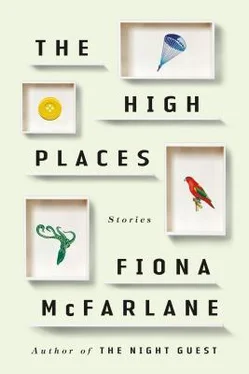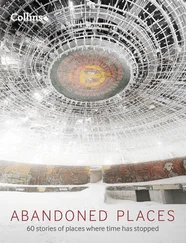The Dwyers were both too large for the chairs at the café in Plaka — they teetered, with the chairs, on the cobblestones — but Janet was relieved to be sitting down, however precariously. She was made uneasy by the marble pavements of Athens, over which she slipped in the soft soles of her comfortable shoes. The Parthenon was humourless above them; it meant too much. It was almost offensive. Janet felt that it was wasteful not to look at it while she had the opportunity; at the same time, it exhausted her. She could find nothing human about it — nothing like Mycenae’s shining masks.
‘Let me see your passport photos,’ said Amy, who was plainly proud of hers.
‘Oh, no!’ cried Janet, reaching into her handbag.
Her passport was so new next to Amy’s. She saw Eric compare them. He turned to Murray, uncharacteristically expansive, and said, ‘Nothing prepares you for the Greek light.’
The Dwyers nodded and smiled. Australia had prepared them for the Greek light. But it was still something different, if familiar: the great, burdened light, the Attic light. They sat among the flowers of the café as if prepared for sacrifice. In her embarrassment, Janet wanted to speak of Damian. It was a struggle not to talk about him too frequently. Into the silence of the table she wanted to say, ‘Damian has a lovely Chinese girlfriend.’ Or, ‘Damian was promoted last year.’ Instead she shifted her glass with her fingertips and noticed with surprise the dirtiness of her nails. She would have liked the café to smell of fish and rosemary, but instead there was the sun on dust, and sunscreen.
‘I had quite an adventure this morning,’ announced Amy, whose meaningful days began hours before anyone else’s. She told of setting out from the hotel at sunrise, of her walk among the early-morning streets and markets, her coffee at a café crowded with workers, her encounter with a man named Christos who wanted to take her to Marathon. She spoke with solemnity of her lone walk, of the café and workers, but her tone altered for the story of Christos: she became amused and worldly.
‘Why Marathon?’ asked Janet.
‘That’s where he lives,’ said Amy, crumbling a floury biscuit between her droll fingers. ‘The man from Marathon.’
Eric stirred his coffee and looked toward the immemorial street.
‘And what did you say to him?’ asked Janet. She felt a small throb of envy. Before the trip, as she brushed up on the Greek dramatists, she worried that she couldn’t possibly do Athens justice, and here she was, tired and hot, with dirt under her nails. But here was Amy, not reading about Greece, but actually living it, and all this from a hotel, not an apartment. And still beautiful enough for a man in a café to ask her to go home with him.
‘I told him I was happily married,’ said Amy, with a brief look at Eric, a brief hand on his mammoth arm, and Eric inclined his head toward her, stirring, stirring his coffee. ‘I said I didn’t trust his intentions. In no uncertain terms.’
‘And what did he say?’ asked Janet. Murray pressed her foot under the table with the firm undersole of his sensible shoe, because they had decided last night, under the sweltering ceiling of their apartment, that they would stop encouraging Amy by asking questions.
Amy pursed her lips and leaned back in her chair in preparation for laughter. ‘He said, “I’m hungry, but I’m not that hungry.”’
And Eric let out a great, unsuspected laugh, a bark of laughter which Murray later described as a guffaw. It drew attention to their table, it silenced Janet, it left Amy adrift in the end of her story about Christos of Marathon. They sat startled among the plants and crockery. Eric tasted his coffee and pushed it away.
Janet all at once regretted every moment of the trip. Murray hated to travel. Damian had talked her into it; she’d talked Murray into it. She was furious with everyone. Travel was ridiculous. The dead plants, the fled cats, the concern at mounting mail. What could someone like her possibly be doing in Greece? The Greek light sped over the streets, the marble pavements tilted. So much marble. Restaurants in car parks, the blue dusk, doves among the stones. Greece was life, Amy said. But the Greeks must water plants and feed cats and answer mail. There were people here who taught high school, just as she had. Where were those people? They were speaking all around her, she supposed, but she couldn’t understand them, and never would.
The light ticked on and the real sun fell. The couples arranged to meet at the hotel for cocktail hour. Janet and Murray, arriving early, drank wine, intimidated by ouzo and carefully aware they were not paying guests. They drank too quickly as they waited for Eric and Amy to appear, and the sight of the Andersons made them drink faster still.
‘I’ll get drinks. A Scotch?’ Murray asked Eric. They were the patient husbands of friendly wives. Their conversation had been reduced to a funny little parody of manliness: liquor and modes of transport and the distances between places. Among the sharp, pointed objects of the male world they sat quietly, and Murray asked again, ‘Scotch, Eric?’
‘Oh, no,’ said Amy. ‘No, he’s just brushed his teeth. So have I. We’ll wait. Wouldn’t go, would it — toothpaste and whiskey?’
‘If for no other reason,’ said Eric. Sombre. Janet looked, and he winked. Don’t wink, thought Janet. You’re not a boy. She was susceptible to winks. They prevented her from feeling overlooked, and notice of this kind caused her heart to flower with gratitude. Made nervous — more nervous — she reached for her empty wine glass, then drew back. A funnel of lamplight fell over Eric and Amy. Janet told Murray she would join him at the bar.
‘What was all that about?’ said Murray. ‘The not drinking?’
‘Yes, what?’
It was about too much, or too little.
‘Do you think he’s…?’
‘Couldn’t be.’
‘What’s he drunk other nights?’
‘Not much. Never what you’d call too much.’
‘The truth, then? Toothpaste?’
‘Don’t they want us paying? Is that it?’
They could only conclude: Don’t worry, not our business. People arrived at the bar later than they had and were served first. The Dwyers tested out their Greek on each other, then ordered haltingly in English. Behind them the music rose in volume and couples began unexpectedly to dance — unexpected to Janet, although she had imagined hotels of this kind and people dancing in them. The lights were lowered on the tables and the dance floor was illuminated. The Andersons were dancing. So the Dwyers hesitated in the semi-darkness. Diminished, utterly, by their fear of the Andersons, who had found Greece — Amy had found Greece — and now moved as if through grape vines and olive groves, over the hard ground toward the mountains. The sea would rise up to meet them; the original sea. The Dwyers waited beyond the lights with extravagant drinks in their hands. They stood foolishly, and they stood without speaking to one another. They were afraid, and they waited.
* * *
You might say Janet had brought the Andersons together, although this wasn’t quite true. They were engaged when the Dwyers first met them, but toward the end of Eric’s PhD Amy considered breaking it off. She’d fallen in love, she confessed to Janet, with someone else, someone whose greatness of character , whose kindness and deep commitment to love were qualities, lacking in Eric, she couldn’t afford to be without. Janet approved of these vague qualities — she recognised them so acutely in Murray that she worried, briefly, that Amy might have fallen in love with her own husband — and disapproving of Eric’s magnificence, she experimentally encouraged her friend to pursue this new man.
Читать дальше












